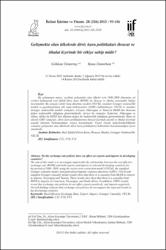| dc.contributor.author | Demirtaş, Gökhan | |
| dc.contributor.author | Demirhan, Banu | |
| dc.date.accessioned | 2019-12-05T08:37:22Z | |
| dc.date.available | 2019-12-05T08:37:22Z | |
| dc.date.issued | 31/05/2013 | en_US |
| dc.identifier.citation | Demirtaş, G. & Demirhan, B. (2013). Gelişmekte olan ülkelerde döviz kuru politikaları ihracat ve ithalat üzerinde bir etkiye sahip midir?, İktisat İşletme ve Finans, 28(326), 93-116. | en_US |
| dc.identifier.uri | https://hdl.handle.net/11630/7351 | |
| dc.description.abstract | Bu çalışmanın amacı, seçilmiş gelişmekte olan ülkeler için 1980-2009 dönemine ait verileri kullanarak reel efektif döviz kuru (REER) ile ihracat ve ithalat arasındaki ilişkiyi incelemektir. Bu amaçla vektör hata düzeltme modeli (VECM), standart Granger nedensellik modeli ve genelleştirilmiş etki tepki fonksiyonları (GIRF) kullanılmıştır. VECM ve standart Granger nedensellik modeli sonuçları, Cezayir, Nikaragua ve Tunus’ta REER’den ihracata doğru nedensellik olduğunu göstermektedir. Ayrıca bu sonuçlar, Kamerun, Nikaragua ve Güney Afrika’da REER’den ithalata doğru bir nedensellik olduğunu göstermektedir. Buna ek olarak GIRF sonuçları, döviz kuru politikalarının ihracat üzerinde pozitif ve ithalat üzerinde negatif etkisinin bulunmadığını ortaya koymaktadır. Genel olarak değerlendirildiğinde sonuçlar, gelişmekte olan ülkelerde döviz kuru politikaların beklentileri karşılamadığını işaret etmektedir. | en_US |
| dc.description.abstract | The aim of this study is to investigate empirically the relationship between the real effective exchange rate (REER) and both exports and imports in selected developing countries for
the period of 1980- 2009, using the vector error correction model (VECM), the standard Granger causality model, and generalized impulse response functions (GIRF). VECM and standard Granger causality model results show that there is a causality from REER to exports in Algeria, Nicaragua and Tunisia. These results also show that there is a causality from REER to imports in Cameroon, Nicaragua, and South Africa. In addition, GIRFs results reveal that exchange rate policies do not affect exports positively, and imports negatively. Overall findings indicate that exchange rate policies do not support the expected results in the developing countries. | en_US |
| dc.language.iso | tur | en_US |
| dc.rights | info:eu-repo/semantics/openAccess | en_US |
| dc.subject | Reel Efektif Döviz Kuru | en_US |
| dc.subject | İhracat | en_US |
| dc.subject | İthalat | en_US |
| dc.subject | Granger Nedensellik | en_US |
| dc.subject | Real Effective Exchange Rate | en_US |
| dc.subject | Export | en_US |
| dc.subject | Import | en_US |
| dc.subject | Granger Causality | en_US |
| dc.title | Gelişmekte olan ülkelerde döviz kuru politikaları ihracat ve ithalat üzerinde bir etkiye sahip midir? | en_US |
| dc.title.alternative | Do the exchange rate policies have an effect on exports and imports in developing countries? | en_US |
| dc.type | article | en_US |
| dc.relation.journal | İktisat İşletme ve Finans | en_US |
| dc.department | Bölüm Yok | en_US |
| dc.authorid | 0000-0002-6757-5613 | en_US |
| dc.identifier.volume | 28 | en_US |
| dc.identifier.startpage | 93 | en_US |
| dc.identifier.endpage | 116 | en_US |
| dc.identifier.issue | 326 | en_US |
| dc.relation.publicationcategory | Makale - Uluslararası Hakemli Dergi - Kurum Öğretim Elemanı | en_US |
| dc.contributor.institutionauthor | Demirtaş, Gökhan | |
| dc.contributor.institutionauthor | Demirhan, Banu | |



















